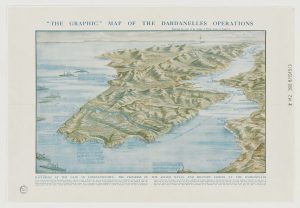
Finest Hour 169
Churchill and the Indirect Approach
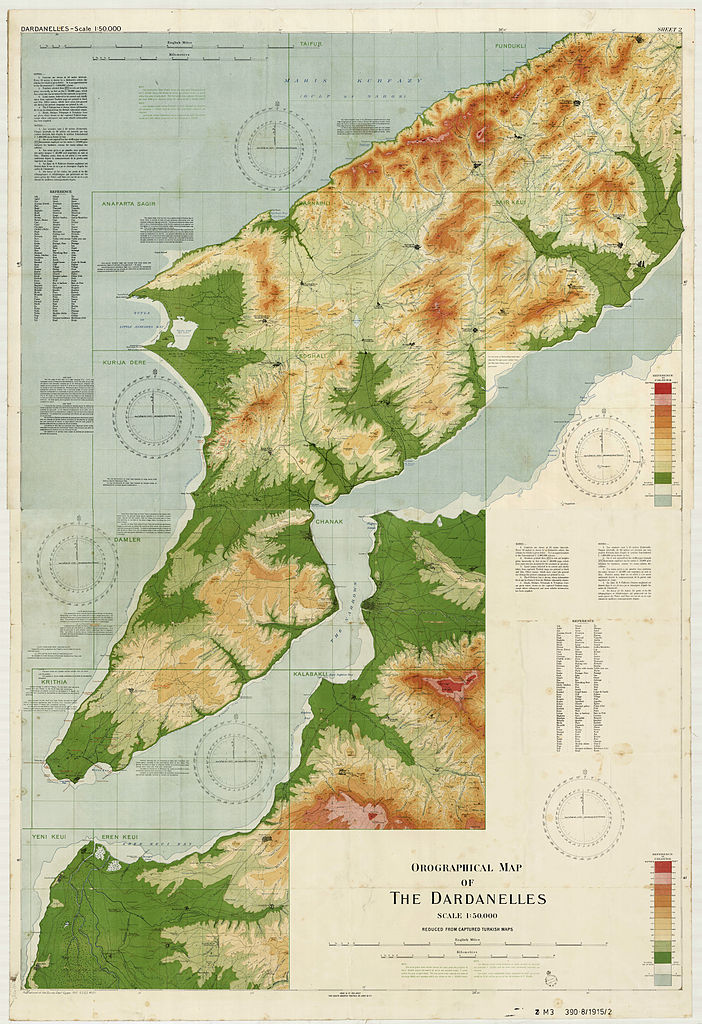
November 10, 2015
Finest Hour 169, Summer 2015
Page 16
By Col. John C. McKay
John C. McKay is a twice combat-wounded US Marine Corps colonel who has separately led organizations composed of US and indigenous forces in war and peace.
The Dardanelles in 1915 and Italy in 1943 — A Strategic Analysis

2025 International Churchill Conference
Pragmatism is the essence of strategic thought. Dependent on the realities of geography, society, economics, and politics, as well as on other intangible (often fleeting) factors, it cannot be otherwise. Winston Churchill, as First Lord of the Admiralty, 1911–15, then as Prime Minister, 1940–45, embodied the essence of the strategic thinker in both World Wars. In the early stages of the First War Churchill grappled with possible operational means with which to maneuver around the deadlock on the Western Front. During the early stages of the Second War, his theory of waging war on the Continent relied on a peripheral strategy, which given the strategic balance at the time was both shrewd and prudent.
In both conflicts coalition warfare was an undeniable prerequisite. Intimately exposed to the fundamentals and actualities of coalition warfare during the Great War, in the inter-war years Churchill honed his understanding of its vagaries, pitfalls, and compelling necessity in writing of his ancestor, John Churchill, the first Duke of Marlborough. His 1914–18 experience, writing about his great ancestor, and an assiduous and perspicacious understanding of history marked Churchill as an exceptional individual whose knowledge and understanding were crucial in charting the course of the Allied coalition to victory in 1945. Churchill’s counsel, frequently seconded by President Roosevelt, prevailed up through the Tehran Conference in late 1943.
During his first tenure at the Admiralty, Churchill developed into what Gordon Craig calls the “political leader as strategist.”1 Apart from Lloyd George and Maurice Hankey, Secretary to the War Council, Britain’s First World War Cabinet lacked strategic thinkers. On 13 August 1911, following the Agadir Crisis in April, Churchill as Home Secretary wrote, unsolicited, a memorandum for the Committee of Imperial Defense in which he presciently laid out the probable course of a German invasion of France. By contrast, A. J. P. Taylor observed of Prime Minister Asquith, “Though resolved on victory, he supposed the only contribution that a statesman could make was to keep out of the way, while free enterprise supplied the arms with which the generals would win the battles.”2
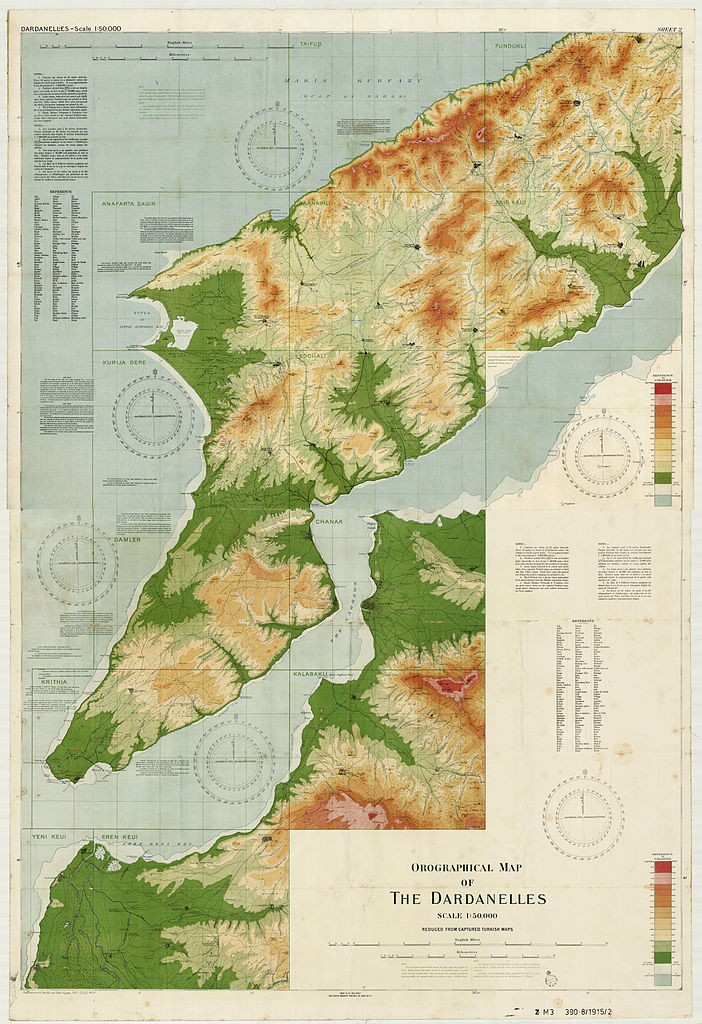 From the opening operations of the Great War in August 1914 emerged a state of strategic stalemate that dominated the conflict until the end. The plan for a short but undoubtedly violent war was laid to rest by the end of 1914. The numbing toll of casualties, the drain on the national treasure, and the incipient strains on national social cohesion caused Churchill to explore possible military operations on the northern fringes of Germany, in the Middle East, and in the Balkans. Churchill’s fecund mind and combative personality did not lend themselves to acquiescence or passivity. In a memorandum to Asquith dated 29 December 1914, he famously made his point: “Are there no other alternatives than sending our armies to chew barbed wire in Flanders?”3
From the opening operations of the Great War in August 1914 emerged a state of strategic stalemate that dominated the conflict until the end. The plan for a short but undoubtedly violent war was laid to rest by the end of 1914. The numbing toll of casualties, the drain on the national treasure, and the incipient strains on national social cohesion caused Churchill to explore possible military operations on the northern fringes of Germany, in the Middle East, and in the Balkans. Churchill’s fecund mind and combative personality did not lend themselves to acquiescence or passivity. In a memorandum to Asquith dated 29 December 1914, he famously made his point: “Are there no other alternatives than sending our armies to chew barbed wire in Flanders?”3
The Dardanelles was not Churchill’s first choice of an operation through which to affect maneuver around the slaughter on the Western Front. A month before the assassinations in Sarajevo that led to the conflict, Churchill had his Admirals and staff revive and examine plans for seizing islands lying close to the continent to serve as forward operating bases for an envisaged blockade of Germany. Four days following the declaration of war, Churchill proposed the seizure of a Dutch island close to the coast, in violation of Dutch neutrality. The Cabinet and Foreign Office overruled him. Nevertheless, the Royal Navy at the end of 1914 was in a commanding position. It had successfully transported the British Expeditionary Force to France without incident, all but eliminated German maritime trade from the seas, and annihilated the Imperial German Navy’s East Asiatic Cruiser Squadron at the Falkland Islands.
By 1915, however, Churchill, was impatient with what he saw as the passivity of the Royal Navy. He was the impetus in setting afoot various schemes to outflank the Germans or bottle up their High Seas Fleet. Turkey, even before it entered the war in October 1914, had not escaped Churchill’s mind, though he considered “a Dardanelles offensive as a minor and subsidiary operation.…”4 However, with the Russians hard pressed in the Caucasus, the Turkish attack on the Suez Canal in early 1915, the absolute necessity of ensuring unimpeded passage of Dominion troops from East of Suez, and the pressing need for Russian wheat via the Black Sea and the Dardanelles—and arms shipments in the opposite direction—the Dardanelles operation took on a certain operational logic of its own. Protection of and unhindered access to the emergent oil fields in Persia were equally critical. The Royal Navy was in the later stages of converting the fleet from coal to oil-fired boilers.
Concurrently, intense Entente diplomatic activity focused on the Balkans and Italy. As a member of the Triple Alliance—a defensive arrangement—Italy was bound at most to benevolent neutrality in the circumstances of 1914. Excluding the belligerent states of Serbia and Montenegro, the Balkan Peninsula remained generally quiescent in the period bracketed between Japan’s declaration of war on Germany (23 August 1914) and Russia’s declaration of war—quickly followed by the other Allies—on Turkey (2 November 1914). Two previous Balkan Wars had left their mark regionally: Serbia, Rumania, and Greece emerged victorious, while Turkey and Bulgaria suffered humiliation. The Entente and the Central Powers exploited grievances, real or imagined, in wooing all non-belligerent parties to one side or the other. Circumstances in the Balkans at the time affected the decision to force the Dardanelles, conceived initially as an exclusively naval undertaking. The consequences of the 1915 campaign, however, far exceeded those of the earlier Balkan Wars.
Churchill alone cannot fairly be blamed for the failure of the Dardanelles campaign. He was an energetic First Lord who despite his strategic foresight was badly served by “the loose and redundant committee system of Asquith-Kitchener” responsible for the conduct of the war. This failing Churchill immediately and efficiently addressed during the Second World War by making himself “both head of government and supreme commander of the armed forces.”5 A plausible case can be made for the soundness of the concept of operation of the Dardanelles campaign. Failure arose in execution. In the latter Churchill was mere advocate and part-time player rather than director. The operation morphed from a navy-only operation into a joint land force-maritime operation over which Churchill did not, indeed could not, exercise command and control. The initial naval operation lacked aggressiveness, and the existing command arrangements were poor auguries for ultimate success. The concept need not be, nor was it, invalidated by poor execution.
“Modern war is total, and it is necessary for its conduct that the technical and professional authorities should be sustained and, if necessary, directed by the heads of government who have the knowledge which enables them to comprehend not only the military but the political and economic forces at work and who have the power to focus them all upon the goal.”6 Winston Churchill became Prime Minister in 1940 having learned the lesson well. Eliot A. Cohen notes that “Churchill brought to the Second World War an exceedingly rich knowledge, direct as well as vicarious, of military affairs. Indeed, unique among statesmen, he experienced many of the great wars of his lifetime twice—once in reality, a second time in study, as he reflected upon their structure and meaning.”7 But mistakes were made, some of which had long-term implications for the British Empire. That Churchill has been criticized for reordering Egypt on Britain’s list of strategic priorities from fourth to second, over Malaya and the Cape of Good Hope—the home islands naturally coming first—can credibly be argued to have contributed to the fall of Singapore.
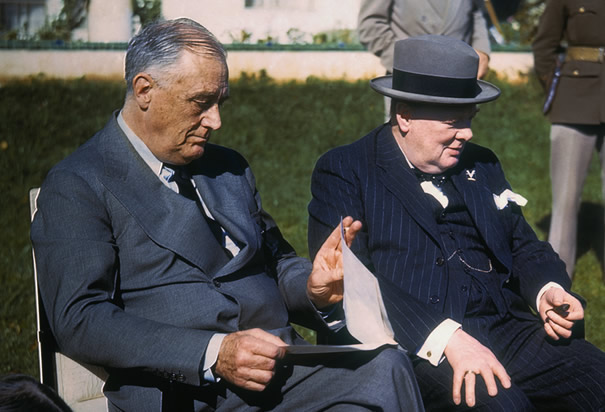 Roosevelt and Churchill meeting in Casablanca after Operation TORCHIn the same month that the United States declared war on Imperial Japan, General Sir Alan Brooke replaced Field Marshal Sir John Dill as Chief of the Imperial General Staff, thenceforth tempering some of Churchill’s more exuberant schemes and paving the way for future close cooperation between Brooke and his US counterpart, General George C. Marshall. Thus was the stage set for the emergence of the Grand Alliance, and a never-close if not at times fraught relationship with the Soviet Union. The common core that bound all three was the defeat of Nazi Germany. The secondary strategic goal, the defeat of Imperial Japan, was entirely an American and British Empire labor. The Soviet Union and Japan had concluded a Neutrality Act on 12 April 1941, which remained precariously in effect until the Soviet Union declared war on Japan on 9 August 1945, following the first use of the atomic bomb.
Roosevelt and Churchill meeting in Casablanca after Operation TORCHIn the same month that the United States declared war on Imperial Japan, General Sir Alan Brooke replaced Field Marshal Sir John Dill as Chief of the Imperial General Staff, thenceforth tempering some of Churchill’s more exuberant schemes and paving the way for future close cooperation between Brooke and his US counterpart, General George C. Marshall. Thus was the stage set for the emergence of the Grand Alliance, and a never-close if not at times fraught relationship with the Soviet Union. The common core that bound all three was the defeat of Nazi Germany. The secondary strategic goal, the defeat of Imperial Japan, was entirely an American and British Empire labor. The Soviet Union and Japan had concluded a Neutrality Act on 12 April 1941, which remained precariously in effect until the Soviet Union declared war on Japan on 9 August 1945, following the first use of the atomic bomb.
Though Churchill and Britain stood alone against Nazi Germany until 22 June 1941, the ground-work for the basic strategic underpinnings of the Grand Alliance was laid out during the secret ABC [American-British-Canadian] Conference in Washington, D.C., January to March 1941. The resulting ABC-1 Plan bound none of the parties but envisaged a joint strategy in which Germany would be the prime target while a war of attrition would be waged against Japan until the defeat of Nazi Germany. The results were confirmed at the First Washington Conference (ARCADIA) between late December 1941 and early January 1942. Though the essentials of ARCADIA held throughout the war, the interpretation and best application of the means to achieve the desired ends continued until termination of hostilities. Given Britain’s predominant interests in the Mediterranean, Middle East, and on the Continent, Churchill came early on to rely on blockade, bombing, subversive activities, and propaganda. An emphasis was to be placed on mobile, striking armored units on the periphery of the Reich rather than an immediate confrontation with Hitler’s main military strength. At the same time, the British and Americans had to preserve the Soviet Union as the vital ally in the war against Nazi Germany. Indeed, statistically and strategically the Eastern Front dominated the Second World War.
Churchill’s strategy was based on pragmatism culled from his First World War experience and the reality of Britain’s pull within the Grand Alliance. Though he benefited greatly from a close personal relationship with Roosevelt, that relationship shifted as the industrial might and manpower of the United States was brought to bear. As early as 1942, American military planners, with the backing of Secretary of War Stimson and General Marshall, advocated an invasion of the Continent in 1943, the BOLERO plan. Churchill and Roosevelt conferred during the Second Washington Conference in June 1942, with the result that BOLERO was scrapped. During a subsequent conference in London, agreement was reached to launch Operation TORCH, the invasion of North Africa.Though Stimson and Marshall were disappointed, both recognized the advantages of TORCH. A more potent factor was the displeasure of the Soviets, and Churchill bore the full brunt of Stalin’s disapproval when delivering the news in Moscow in August 1942.
Operation TORCH led to a major debate on European strategy within the Grand Alliance, specifically between the British and the Americans. The debate lasted until the summer of 1944. The Americans were eager to end the war as soon as possible, believing this best achieved by a major invasion of France. Churchill, growing suspicious of the Soviet post-war intentions, urged the continuation of a Mediterranean strategy resulting from victory in North Africa. He saw the conquest of Sicily and the invasion of Italy as the way to get at the Germans from their “soft underbelly.” By the time of the 1943 Casablanca Conference, though, the dynamics within the Grand Alliance had shifted. The Russians had prevailed at Stalingrad, the Americans were prevailing in the Pacific, and the manpower pool of the former, like the industrial might of the latter, was unmatched.
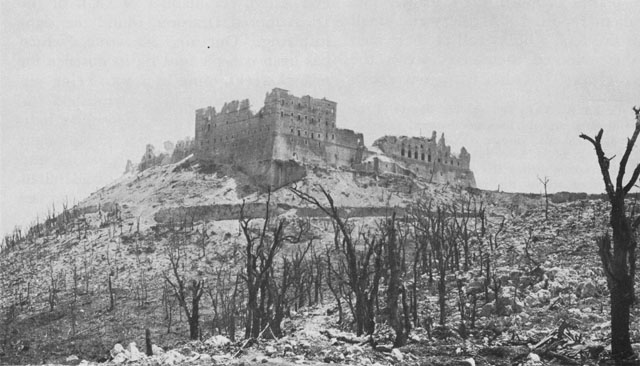 The monastery at Monte Cassino after Allied shellingThe 1915 campaign in the Dardanelles and Gallipoli and the 1943 Italian campaign remain controversial subjects. Churchill was a, if not the, key strategist in both and has been vehemently denounced and staunchly defended for his decisions ever since. What often is overlooked is that Churchill in his thinking, in his oratory, in his actions, and in his writing amply displays those traits that closely identify him as an excellent strategist—not a master strategist, which is a mythical title. But, to be an excellent strategist one has to be a superb political leader. Churchill understood this. The survival of the British Empire had to be paramount in both World Wars. Churchill understood the salient features of both conflicts—the political and the military —and how they might be influenced. Otherwise, he would not have supported the intent of the Dardanelles operation. Nor would he have insisted and prevailed, successfully until the Casablanca Conference and even afterward, upon the peripheral strategy. Hannah Arendt observes in The Human Condition, “Power is actualized only where word and deed have not parted company, where words are not empty and deeds not brutal, where words are not used to veil intentions but to disclose realities, and deeds are not used to violate and destroy but to establish relations and create new realities.”8 These are fitting words for Winston Churchill, the pragmatic strategist.
The monastery at Monte Cassino after Allied shellingThe 1915 campaign in the Dardanelles and Gallipoli and the 1943 Italian campaign remain controversial subjects. Churchill was a, if not the, key strategist in both and has been vehemently denounced and staunchly defended for his decisions ever since. What often is overlooked is that Churchill in his thinking, in his oratory, in his actions, and in his writing amply displays those traits that closely identify him as an excellent strategist—not a master strategist, which is a mythical title. But, to be an excellent strategist one has to be a superb political leader. Churchill understood this. The survival of the British Empire had to be paramount in both World Wars. Churchill understood the salient features of both conflicts—the political and the military —and how they might be influenced. Otherwise, he would not have supported the intent of the Dardanelles operation. Nor would he have insisted and prevailed, successfully until the Casablanca Conference and even afterward, upon the peripheral strategy. Hannah Arendt observes in The Human Condition, “Power is actualized only where word and deed have not parted company, where words are not empty and deeds not brutal, where words are not used to veil intentions but to disclose realities, and deeds are not used to violate and destroy but to establish relations and create new realities.”8 These are fitting words for Winston Churchill, the pragmatic strategist.
Endnotes
1. Gordon A. Craig, “The Political Leader as Strategist,” in Makers of Modern Strategy, ed. Peter Paret (Princeton: Princeton University Press, 1986), pp. 481–509.
2. A. J. P. Taylor, Politics in Wartime and Other Essays (New York: Atheneum, 1965), pp. 20–21.
3. Churchill to Asquith, 29 December 1914, Churchill Papers, 26/1, Churchill Archives Centre, Cambridge.
4. Christopher Bell, Churchill and Sea Power (Oxford: Oxford University Press, 2013), p. 62.
5. Craig, p. 498.
6. Winston Churchill: The Complete Speeches, 1897–1963, ed. Robert Rhodes James, 8 vols. (London and New York: Chelsea House Publishers, 1974), vol. 7, pp. 7285–93.
7. Eliot A. Cohen, Supreme Command: Soldiers, Statesmen, and Leadership in Wartime (New York: Anchor Books, 2002), p. 106.
8. Hannah Arendt, The Human Condition, 2nd rev. ed. (Chicago: University of Chicago Press, 1999), p. 200. This book was first published in 1958.
Subscribe
WANT MORE?
Get the Churchill Bulletin delivered to your inbox once a month.

